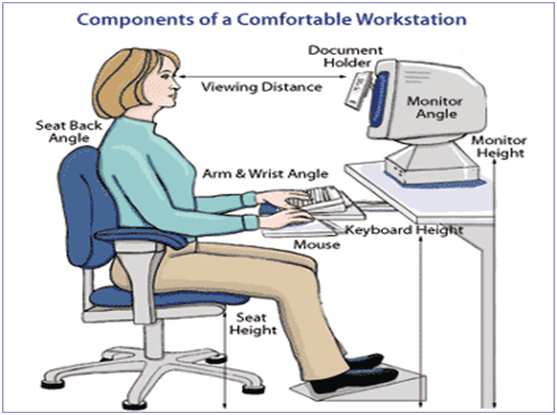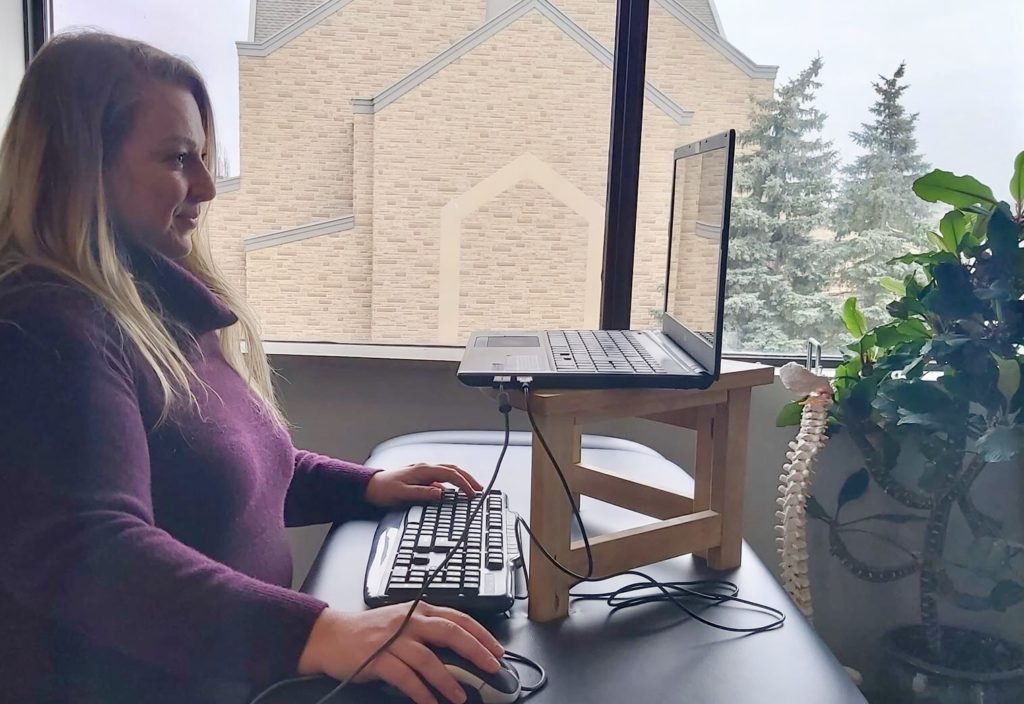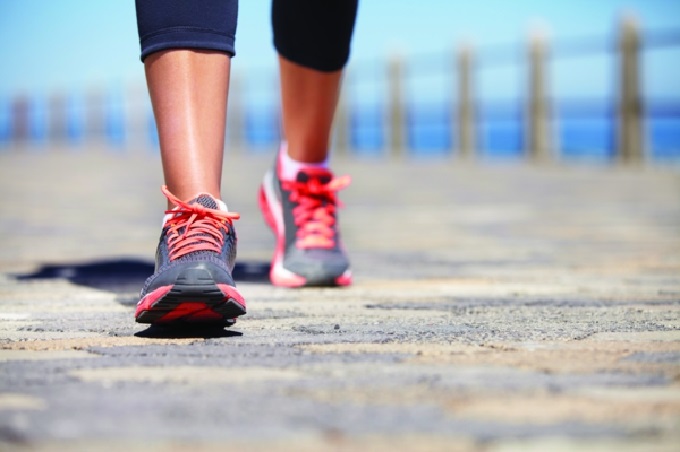Insight from your Oakville Chiropractor and Friends!
Life as we know it has changed a lot in the last few weeks. Dr. Jenn and Dr. Steve wanted to reach out, check in, and provide everyone with some important information while we all navigate this new reality. Our Oakville chiropractor, along with some other amazing practitioners within the community, have put together some information that is now more relevant than ever.
Chiropractic Home Ergonomics
In light of the current events, most people have been asked to work from home for the foreseeable future. While this comes with a number of different challenges (taking care of your 3 kids, managing working in the same space as your spouse, trying to not go completely stir crazy), we don’t want your ergonomics to be one of them! Trying to find a comfortable space to sit at home can be difficult, so we have some simple tips for you!
Dr. Jenn says: “If You Have a Home Office”…
Lucky you! You actually have a space to set up and spread out to get some quality work done! Here are a few ergonomic tips to make sure your workspace won’t cause aches and pains. Learn more about Doctor approved ergonomics here.

Monitor: Make sure your monitor is about an arms length away from your body. If you need glasses to read your screen, please wear them. This will prevent you from straining your eyes, but also prevent you from awkwardly leaning into the screen to read. You should also make sure the screen is positioned at a height that allows you to look straight into the center of the screen while keeping your head/neck in a neutral position. If you screen is too high or low, your neck muscles can easily become overworked and eventually start causing you pain!
Chair: We aren’t going to suggest you go out to buy yourself a completely ergonomic chair… yet. Hopefully you have an adjustable chair at home, so that your arms can rest comfortably on the desk and your feet can rest comfortably on the floor. If your chair is not adjustable, place something on the floor under your desk to rest your feet so that your legs are not hanging. If your chair does not adequately support your lower back, roll up a small towel and place it in the small of your back. This gentle support can have a significant positive impact on lower back pain.
Telephone: If you spend a lot of time on the phone, we suggest using speakerphone whenever possible. If your house is chaos right now, and your boss won’t appreciate hearing your kids playing in the background, then a headset may be a wise investment. Do not hold your phone between your shoulder and your ear by tilting your head to the side. Take the appropriate steps so that you don’t have to put your spine in that position!
If You Don’t Have A Home Office…
We know it’s tempting to grab your laptop and a snack and set up shop on the couch. Please don’t. Just don’t. If you have been to our clinic and had the pleasure of Dr. Steve’s lecture about text neck and the problems it is causing in today society you will understand. Our Oakville Chiropractic Clinic has had an abundance of patients with phone, tablet and laptop related injuries over the last 5 years. Looking for some chiropractor approved text neck exercises?
Avoid Working In Bed or on the Couch: We know these areas are the first the come to mind when you think about resting comfortably. These areas are unlikely to properly support your spine as they are often too soft. Sinking down into the couch to watch a movie may feel great, but staying in that position for 8 hours a day is a bad idea. Choose to work at a table where you have a firm, supportive chair and don’t have to slump over your work station.

Use a Separate Keyboard and Mouse: Even if you have a laptop, we suggest you use a separate keyboard and mouse to allow your screen to be propped up to the proper height. Laptops encourage us to slouch forward. They encourage very poor postures for the head, neck and upper back. Propping up your laptop on a stack of books or small stool, and using a separate keyboard will help you stay aligned while working from home! If you have a PC you can pick up a keyboard and mouse for 20 bucks on amazon! If your an apple fan…sorry its more like 100 bucks.
Remember to Take Breaks: This rule is not specific to working from home, but it can often be forgotten when working from home. Try to get up and work a regular work day as normally as possible. Don’t avoid work until the end of the day and try to cram it all in while watching a movie. Get up and take a break from your work station every hour. Stretch your legs!
Take a Posture Break!
As our Oakville Chiropractor just mentioned – it is important to take breaks. Staying in one static posture all day is not healthy. Our bodies were made to move! Dr. Steve and Dr. Jenn put together a really simple set of stretches and exercises that can help undo the damaging effects of poor posture.
Don’t have time to complete the whole list? No problem! Pick and choose your favourites and stick with those. Completing some is better than doing nothing! Be kind to your spine! Another common injury that is discussed in another blog is thumb pain, text thumb or De Quevian’s. Infomration from your Oakville Chiropractic Clinic and help for De Quervian’s can be found here
Finding the Calm in the Corona Storm
Remember when we thought life was stressful? Two short weeks ago, we were thrust into a rapidly progressing global pandemic that made each and every one of us gain some perspective on our lives as they were, and put our crisis coping capacities to the test. Stress is inevitable during times likes these. The nature and duration of the circumstances surrounding this virus are both terrifying and uncertain. It is okay to feel worried about the situation. It is okay to feel sad. You may even be experiencing emotions, such as: anger, panic, loneliness, confusion, and resentment. While it is okay and normal to experience these myriad emotions, we need not let them take over our lives and dictate our moment-to-moment interactions or decisions. We also need to be mindful of how these emotions are impacting our lives at home, with loved ones, given they are generally the ones to be on the receiving end of our stress-driven behaviours.
While we cannot control what is going on around us, we can absolutely mitigate the internal impacts of what is transpiring around us by adopting some general self-care practices and coping strategies. Here is a list of eight things you can do to help you find your calm amidst this Corona storm:

Try to maintain some semblance of a routine. Many people have reported that this time feels like that transitional time, between Christmas and New Year’s, when there is minimal structure, routine or expectations. This is fine for a week or two but given that we have no idea how long this will last; it is a good idea to try to maintain some structure and routine. For many folks, unstructured time can actually exacerbate Anxiety, and only serves to accentuate feelings of chaos and disarray. Set an alarm. Get dressed. Have some general tasks you will complete throughout the day, and ensure to schedule in some time for self-care and relaxation.
Be mindful of the information and conversations you are exposing yourself to. When scrolling social media, watching the news, or having conversations with people in your circle, observe how the information that is being shared is making you feel. While it is important to stay informed, it is not necessary to take in all of the information that is being shared out there. Some information is exaggerated and some of it is completely untrue. Try to stick to credible sources and only expose yourself to the necessary facts needed to keep you and your family safe and healthy and to be aware of the current situation. Be mindful of excessively checking for updates. It is generally a good practice to set boundaries around who and what you expose yourself to, and this is especially pertinent at a time like this, where the energy tends to be quite heavy.
Practice grounding techniques, such as: Yoga, Mindfulness, Meditation, EFT-Tapping, and Breathwork. You can search for most of these kinds of practices online for free, using YouTube. Some things you can search, include: “Beginner/Gentle Yoga,” “Guided Meditation,” “Breathing Exercises,” or “Mindfulness Practices.” A general mindfulness practice, involves paying attention to the present moment, without judgment, noticing when your mind wanders or worries, and gently bring your awareness back to the present, focusing on either your breathing, or any other tangible object or even an affirmation, such as: “It’s going to be okay. I am going to be okay.” You can also bring your attention to your five senses, and focus on five things that you see, four things that you hear, three things that you feel, two things that you smell, and one thing you taste, for example.

Get outside and move. Moving our bodies is an excellent way to reduce the impact of stress, and doing so outside in the fresh air is especially important during times like these, when we are largely housebound. Getting out in nature is ideal if that is accessible to you or perhaps, a walk by the water to help ground and center. Some extra Vitamin D is also never a bad idea during a global health crisis.
Stay connected. Perhaps you are an introvert and find yourself enjoying this mandated social distancing. Regardless, we are human beings, wired for connection, and it is healthy and important to maintain connection with friends and loved ones, especially during times like these. Isolation is detrimental to our mental health and wellbeing, so pick up the phone or connect on whatever online platform you enjoy using. Sometimes, simply hearing the voice of someone we are connected to can help lower our stress levels.
Remind yourself that “This too shall pass.” Sometimes, Anxiety gets the best of us and gives us the message that hard times are going to go on indefinitely but this simply is not the case. Acknowledge how you feel about the situation and observe your thoughts and feelings with compassionate curiosity. Name how you are feeling if you can. If we can name it, we can better tame it! Then, remind yourself that this will eventually pass, and bring yourself back to what is happening in the present moment. Over and over again.
Be mindful of substance use and alcohol consumption. During this time of social distancing and global health crisis, it is not unusual for people to increase their amount of substance use or alcohol consumption. Try to be mindful of your emotions and bodily sensations that precede wanting to reach for that glass of wine or other substance. Notice when you feel bored, tired, lonely, angry, sad, anxious, upset, and see if you can sit with that feeling, breathing through it. You may wish to practice “urge-surfing,” which involves surfing the urge to engage in a substance or behaviour. Distraction can be a helpful tool for the short-term, if you simply cannot bear the feeling. Practice some deep-breathing. Move your body. Chat with a friend or loved one. Watch a show. Read a book. Find an alternative to help you cope with the underlying feeling(s).
Reach out for support. Look for the helpers! There are many people out there, providing services, both formal and informal, to folks who are in need. There is nothing to be ashamed of, if you feel that you are requiring some support, whether it be financial assistance, mental health assistance, or assistance with other practical tasks, like getting groceries. We are all being impacted by this in some way, and we are all in it together.

Janice is a holistic psychotherapist, registered social worker, certified yoga and meditation teacher, and college professor at Sheridan College. She supports individuals experiencing a range of mental health and emotional concerns, and has been fortunate to be able to continue offering these services online and/or via telephone. If you are seeking support from a professional, you can connect with her at: [email protected] or follow her on Instagram @janice__gill or Facebook @ Janice Gill. You can also visit her website at www.janicegill.ca
Optimizing Digestion to Boost Immune Health
Did you know that approximately 70% of our body’s immune system – yes 70% – is located within the gut?!
In today’s article Dr. Andrew Hubbard, a digestive-focused Naturopathic Doctor based in Oakville discusses the importance of the gut in maintaining optimal immune health. He discusses simple lifestyle strategies and provides information about herbs and supplements that could be helpful in boosting your natural defences.
The gut is constantly being challenged from the dangers of the external environment. It’s job is to maximize nutrient uptake while keeping the host – that’s us – protected from harmful invaders. It’s like our body’s border patrol. So it makes sense that the gut would be well protected with a robust immune system. In fact, we have a vast network of immune cells lining our digestive tract. It’s called the gut-associated lymphoid tissue, or GALT for short.
The GALT collects, interprets and shares information on possible threats with other parts of our immune system like the ones that line our ears, throat, sinuses and lungs. Meaning if your immune system is over-active in the gut it may be overactive in other places too. If you’ve ever gotten a stuffy nose, felt phlegm in the back of your throat or began to cough shortly after eating certain foods you’ll understand this concept well.
Have chronic sinus issues? I’ve got answers here
Needless to say it’s important to keep your gut healthy in these trying times!
And in times of stress and fear, our immune system can take a hit. Not only that, but those living with chronic digestive issues will tell you that stress, a change in routine and a change in diet can often worsen their symptoms. We’re certainly seeing all three of these changes now. And for some it’s a perfect storm.
Want to learn more about how stress affects the gut? Read this article
Some of you may be thinking: “But I don’t have any digestive issues??”
And while you may not have gas, bloating, diarrhea or any of the more obvious signs of digestive imbalance, it doesn’t mean the immune system in the gut is performing up to par. It doesn’t mean your gut is “healthy”.
Other signs that may indicate your gut is overwhelmed are things like joint pain, brain fog, headaches, fatigue, anxiety, and skin rashes to name a few. Pay close attention if you notice these symptoms particularly after eating certain foods or the day after over-indulging.
Immune Boosting Gut Bugs
Why is there such a strong connection between our gut and the immune system?
Because every minute of every day our gut bacteria are constantly communicating with the immune cells in the gut. Every decision, if you will, whether to dampen inflammation or ramp it up to deal with an infection, is signalled between both bacteria and immune cells. This is called cross-talk. This concept is important because it illustrates how we have the opportunity to influence our gut bacteria and thus our immune system every day.
How do you do this?
I’m glad you asked.
Stress, anxiety and fear dampen our immune response and can change our gut bacteria for the worse. On the other hand, things like connection, mindful breathing or meditation, and healthy stress exposure (like moderate exercise) can enhance our immune system. It always comes back to balance!
And with balance in mind let’s get to some of my top tips for optimizing digestion to boost immune health.
Shop, Cook, and Eat Smart!
With grocery stores aisles purged of breads, pastas, canned and processed foods, now’s a good time to explore the outer aisles of the grocery store. This is where you’ll find the most nutritious foods. And yeah, grab a box of cookies while you’re at it!

Try to eat the rainbow by eating different coloured fruits and vegetables. Grab some greens, some reds, some blues and everything in between. The colours contain plant compounds that feed bacteria, reduce inflammation and optimize immune health. In my experience, kids love this idea – they think it’s such a fun challenge.
Foods that are specifically gut-friendly and immune enhancing are foods like mushrooms (portobello, shitake, etc), oatmeal and bone broths. Portobello pizza anyone?! These foods contain prebiotics that feed both bacteria and immune cells.
Green tea, or my favorite, matcha, contains polyphenols that are anti-inflammatory, anti-viral and gut-supportive. With a healthy dose of both caffeine and the amino acid L-theanine it helps support a calm, yet focused state to tackle the day’s activities.
Garlic. Everyone’s favorite. And now that were spending less time in each other’s faces, go ahead and eat that clove of garlic! But before you do, crack it open to activate the allicin, it’s anti-viral, antibacterial component.
Just a word of caution around garlic, in those with sensitive stomachs garlic can be quite gas-forming and you may want to start small.
While diet isn’t a one-size fits all approach, incorporating some of these foods in your diet in new and creative ways can add both health and variety to your plate. There’s no need to prescribe to a restrictive dietary pattern based on the latest nutritional dogma. Instead, focus on expanding your diet. And a cookie or two here and there won’t hurt!
Cooking a meal together as a family is another great way to connect, reduce stress and engage kids and adults alike. Mix things up. Find a good recipe. Try some new foods. Your palette and your immune system will thank you.
Don’t know how to cook?? Now’s a great time to learn!
Prioritize Sleep & Healthy Stress Exposure
There’s a direct correlation between sleep, stress and immune function. Cortisol, the main stress hormone is needed to mount an appropriate response to inflammation and infection. Long-term elevations in cortisol on the other hand, can cause inflammation and reduce our immune response.
We use sleep as a restorative period to repair the body. When this repair process is interrupted by inadequate or unrestful sleep, inflammation ensues. Even a few nights of disrupted sleep can increase the production of inflammation, dampening our immune response, leaving us more prone to infection and disease.
Have your sleep patterns been thrown off? Mine too. Trouble adjusting to self-isolation? Cabin Fever? I got your back.
Try a few of the following:
- Go for regular walks or exercise at home
- Take a nap under a weighted blanket – my personal favorite
- Breathing exercises for 5 minutes a day
- Get natural light exposure right after waking up
- Shut down devices one hour before bed
- Drink a calming herbal tea after dinner (lavender, lemon balm and passionflower will do)
- Take a hot/cold shower in the morning
- Stick to your regular bedtime
Vitamins, Minerals, Nutrients & Herbs
Zinc, Vitamin D and L-glutamine are all gut-specific nutrients supported by research. Vitamin D for example, is more than just the sunshine vitamin. It actually helps support the lining of the gut. It reduces something called intestinal permeability or “leaky gut”. It also helps increase proteins that fight off harmful microbes like viruses and bacteria. These are called anti-microbial peptides. Finally, vitamin D helps to support the growth of many different types of healthy microbes, diversifying the bugs inside of us. These are all good things for immune health!
Herbal medicine is another powerful tool in optimizing digestion and immune function.
Herbs like codonopsis, actractylodes, licorice, astragalus and reishi are important digestive and immune-supporting herbs. These herbs work by promoting growth of beneficial bacteria, reducing the harmful effects of stress on the body and by directly increasing the activity of immune cells to prevent infection.
Don’t think that I forgot about probiotics. They may have a role here as well.
But here’s what you need to know – not all probiotics will clinically reduce your likelihood of getting a cold or flu. Look for particular strains that do. There are a few out there!
Not all probiotics were created equal: A guide to choosing probiotics wisely
Final Thoughts
It’s important to understand that these practices don’t replace adequate and thorough hand-washing and social distancing measures put in place to protect us all . That being said, these additional measures can not only help you develop a robust immune response now but will leave you with healthy habits that will stick around for anything else life has to throw at us!

Dr. Andrew has a passion for treating a range of digestive conditions like chronic gas, bloating, pain, diarrhea and/or constipation. Dr. Andrew believes that all health begins in the gut! He is currently seeing patients through virtual/telemedicine appointments. Visit his website at www.drandrewnd.com to learn more.
